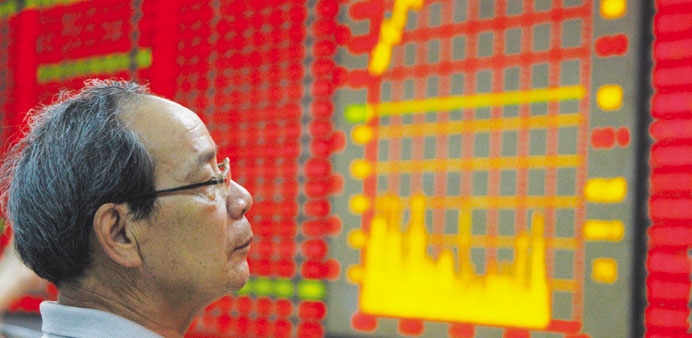An investor watches the electronic board at a stock exchange hall in Huaibei, Anhui Province. Tax officials in Beijing have proposed a capital gains tax on foreign investors that would take 10% of their share trading profits without taking into account their losses.
Reuters/Beijing/Hong Kong
Chinese authorities have alarmed foreign investors with a tougher-than-expected plan to tax their share-trading profits, raising fears of an exodus before fund managers take from investors’ holdings to pay the tax bills, sources told Reuters.
Tax officials in Beijing have proposed a capital gains tax that would take 10% of their share trading profits without taking into account their losses, according to sources briefed by tax officials.
The plan would apply to investors who have traded stocks and other equity-based instruments through China’s two largest portfolio investment schemes for foreigners, and would be levied retrospectively on profits made over the past five years, the sources said.
Investors in the schemes, representing a total $116bn in investment, had been long expecting a retrospective tax to be imposed and had set aside some of their profits in anticipation. But many of them assumed it would be levied on net rather than gross gains, in keeping with international tax norms.
That means the money they have set aside over the past few years is likely to fall short of their actual tax bill, possibly by as much as $4bn, according to Shanghai-based investment analysts Z-Ben Advisors. The details of the tax plan were revealed to investors on Thursday at a briefing in Beijing by municipal representatives of the State Administration of Taxation, the sources said.
A slide shown at the briefing and seen by Reuters said: “Transactions of equity investments are taxed based on gains from each transaction, and the applicable tax rate is 10%. Netting of multiple transactions is not allowed.”
The tax applies to investors in the Qualified Foreign Institutional Investor (QFII) programme and the renminbi-denominated version of the same programme (RQFII) between November 17, 2009 and November 16, 2014.
“It is likely that the majority of QFII investors will find themselves under-provisioned not least because the agreement appears not to include netting and most QFIIs have provisioned based on netting,” said Michael McCormack, executive director at Z-Ben Advisors.
“We expect a wave of net asset value clawbacks by fund managers and also a short-term wave of redemptions from QFII funds as investors attempt to escape prior to the tax clawbacks,” he said.
The State Administration of Tax did not respond to requests for comment.
The informal tax proposal could also be bad news for broker-dealers, which have written billions of dollars worth of derivatives, known as p-notes, that promise investors the performance of China shares. Banks have hedged these products by buying-up shares through their QFII and RQFII quotas.
P-notes, a critical means of gaining access to China for many small investors, change hands frequently, meaning brokers will have no way of clawing back tax owed on historical p-notes.
“It is just as bad for the sell side. Broker dealers that have been writing China p-notes are also likely to be equally under-provisioned,” said McCormack, adding that the price of new p-notes is likely to rise as banks look to recoup the lost funds.
Although netting is unlikely to be allowed, one of the individuals briefed by tax officials in Beijing and Shanghai said existing tax treaties would apply, and that no interest penalties would be levied on the retrospective tax.

